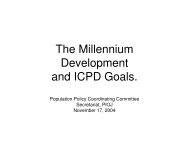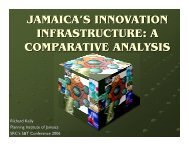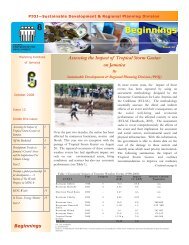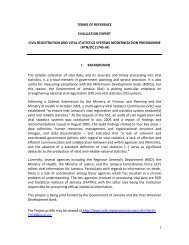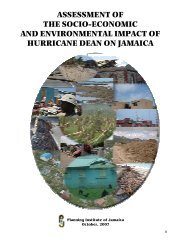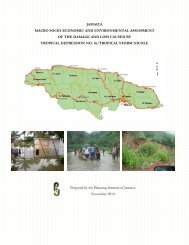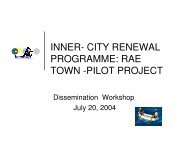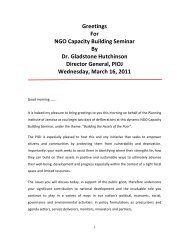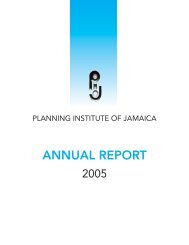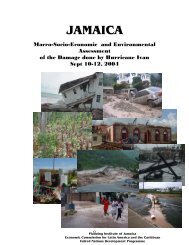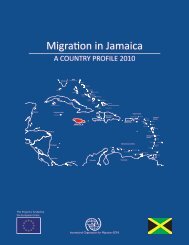PIOJ Growth-Inducement Strategy - Planning Institute of Jamaica
PIOJ Growth-Inducement Strategy - Planning Institute of Jamaica
PIOJ Growth-Inducement Strategy - Planning Institute of Jamaica
Create successful ePaper yourself
Turn your PDF publications into a flip-book with our unique Google optimized e-Paper software.
e more than compensated for by the revenue flow garnered from the expected second<br />
sales which would occur. Moreover, the abolition <strong>of</strong> estate duty would likely boost<br />
<strong>Jamaica</strong>’s development as an asset-management centre and the financial sector as a<br />
whole.<br />
It is further proposed that in order to treat with the cumbersome legal process involved in<br />
probate, an arbitration mechanism be instituted for those estates which are not in dispute,<br />
so that persons may realize a reduction in legal costs and time associated with the<br />
process. For estates in dispute, those would revert to the normal legal process and be<br />
determined either in the Resident Magistrates Court or Supreme Court depending on the<br />
value <strong>of</strong> the estate. Under this new mechanism property valuations would be<br />
streamlined and the unimproved value <strong>of</strong> the land on the tax roll at the point <strong>of</strong><br />
application for probate would determine the transaction value, thereby avoiding the<br />
current time-consuming and <strong>of</strong>ten contentious valuation exercise which seeks to<br />
retroactively determine values at the time <strong>of</strong> the owner’s death.<br />
Current Status: This proposal could be implemented within three months. The impact<br />
on investment and particularly the revenue flows from second sales would be immediate<br />
and will likely prove to be a substantial boost for the local wealth management sector.<br />
5. <strong>Jamaica</strong>n Real Estate Investment Trust<br />
The Government remains the single largest property owner in <strong>Jamaica</strong> (22 per cent)<br />
through several state agencies including the <strong>Jamaica</strong> Railway Corporation. It is proposed<br />
that a Real Estate Investment Trust (REIT) for publicly owned lands be established. The<br />
REIT structure would be designed to provide a similar structure for investment in real<br />
estate as unit trusts or mutual funds provide for stock market investments. The fact that<br />
in <strong>Jamaica</strong> the State-owned real estate is substantially diversified across geographical<br />
markets and property asset classes is substantially beneficial to the functioning <strong>of</strong> a REIT.<br />
The asset classes cover <strong>of</strong>fice, industrial, retail and hotel and other tourism facilities.<br />
This diversity helps to spread the risk in the portfolio as the property values are dynamic<br />
and are determined by varying economic fundamentals in each sector or market segment.<br />
The <strong>Jamaica</strong>n REIT would continue to own this portfolio <strong>of</strong> large properties which, either<br />
due to their size or strategic value, would be available or within the reach <strong>of</strong> the average<br />
investor. These large investments would then be broken up into units <strong>of</strong> smaller value<br />
that can be purchased by private investors who become unit holders. Thus, the <strong>Jamaica</strong>n<br />
REIT would be a unitized portfolio <strong>of</strong> property assets which would be traded freely on<br />
the capital market and the value <strong>of</strong> the unit price would be determined by demand and<br />
supply.<br />
148



